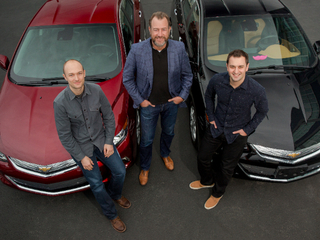Editor’s Note: Our annual Vator Splash Spring 2016 conference is around the corner on May 12, 2016 at the historic Scottish Rite Center in Oakland. Speakers include Tom Griffiths (CPO & Co-founder, FanDuel), Andy Dunn (Founder & CEO, Bonobos), Nirav Tolia (Founder & CEO, NextDoor), Mitch Kapor (Founder, Kapor Center for Social Impact); Founders of Handy, TubeMogul, VSCO, Vinted; Investors from Khosla Ventures, Javelin Venture Partners, Kapor Capital, Greylock, DFJ, IDG, IVP and more. Join us! REGISTER HERE.
The window of time to be a Lyft driver is closing faster than you can imagine. Unless you’re a computer.
Lyft and General Motors (GM), the ridesharing company’s major automaker partner since the beginning of the year, are planning to test self-driving electric cars on city streets sometime in the next year, according to the Wall Street Journal.
I’ve reached out to both companies to confirm the report and to glean more details.

Ever since GM contributed $500 million of Lyft’s last $1 billion funding round, the two companies have been making moves. In March, GM also spent upwards of $1 billion to acquire Cruise Automation, a developer of self-driving technology.
And one of the most tangible outputs of the partnership with Lyft has been Express Drive, a program announced by the two companies in March. In short, Express Drive is a car rental program for individuals that need access to cars in order to drive for Lyft. While most drivers have to pay a fee to rent the cars, the program stipulated that drivers who meet a certain threshold of rides per week (65) won’t have to pay for the rental.
Of course, Express Drive (and any other campaign or promotion launched by a ridesharing company to attract more drivers to the platform) is simply intended as an interim solution until self-driving vehicles hit the road. At that point, companies like Lyft and its big competitor Uber can do away with the expense of drivers, instead simply working with manufacturers to order cars and meet demand.
In my sharing economy predictions for 2016, I optimistically stated we wouldn’t see fully autonomous cars on the road until 2020. According to the newest report, however, that time may come a lot sooner.
According to this report, GM and Lyft’s testing program for self-driving cars would be coming sometime in the next year, and would actually involve real customers who can decide to opt in through the Lyft app. The city (or cities) where the program would be launched has either not been decided or isn’t being disclosed.
The program would rely heavily on the Chevrolet Bolt (pictured above), an all-electric car seen as a competitor to the hybrid Toyota Prius (a staple among Lyft and Uber drivers today). Lyft and GM’s Express Drive program, on the other hand, currently rents out the Chevy Equinox, a mid-size SUV that is neither electric or hybrid.
Aside from not having to pay drivers, it would behoove ridesharing companies like Lyft to rely on electric vehicles in order to save cash on fuel. Not only that, but the lack of a driver means that Lyft could also fit more passengers in the car, useful both for large parties as well as Lyft lines and its recently launched “Carpool” commuter service.
Big changes are afoot, and it looks like they’re coming a lot faster than we thought.



















